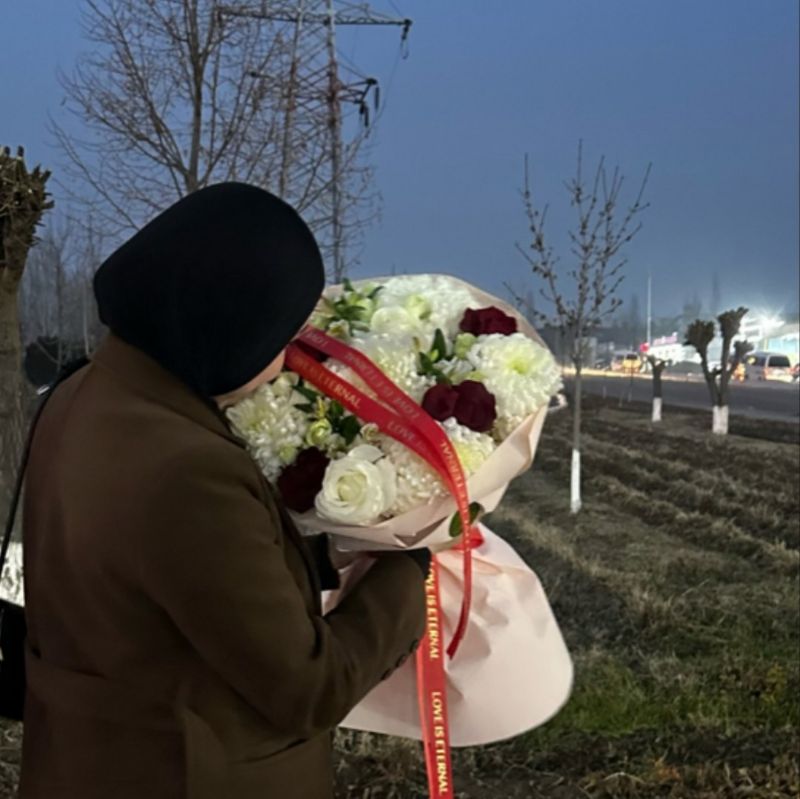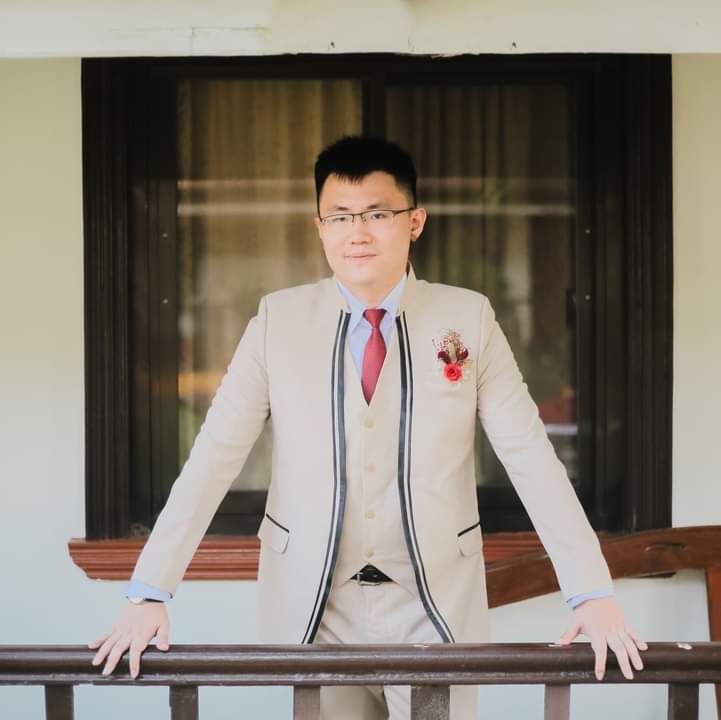Jeffrey Cyphers Wright received his MFA after studying with Allen Ginsberg.
A New Romantic poet, he is also a publisher, art and literary critic, eco-activist, impresario, filmmaker, and artist. He is author of 20 books of verse, including Blue Lyre, Party Everywhere, and Doppelängster; Self Portraits in a Funhouse Mirror. Wright publishes Live Mag! His work appears in Best American Poetry, 2023. He has received a Kathy Acker Award for both publishing and writing. His most recent collection called Fuel for Love, won the James Tate Award for poetry in 2023 and was published by SurVision Books. You can see Wrightt’s films and puppet shows on Youtube.
Hi, Uncle Fun. May I address you by this name? How did you become a poet? When did you write your first poem? What was the state of the American poetry scene when you first started out?
Ha ha. Yes, Yongbo, you may call me Uncle Fun. I am proud of that moniker. Ever since coming to New York in 1976 and falling under the spell of Ted Berrigan and Saint Mark’s, I realized poetry should always be fun. That doesn’t mean it should always be funny.
When I started out, the scene was morphing from a lot of formalism to include new modes of expression. There were the Beats. Black Mountain College. Bukowski. And then a lot of small presses started up. A D.I.Y. (Do it Yourself) spirit took hold.
2. What was your breakthrough work or first poetry collection that drew attention from the poetry community?
I had an epiphany in Alice Notley’s workshop at St. Mark’s. Alice had the class do an Oulipo style writing exercise. She told us to write while she read a text out loud. Suddenly it clicked for me. I began cutting and pasting in my mind, creating a sort of high-toned, John Asbury type, faux narrative. The work is called “Malaise in Malaysia,:” It was published by Toothpaste Press (now Coffeehouse Press) with artwork by Yvonne Jacquette.
3. What characteristics distinguish your representative works from those of your contemporaries?
Employment of the Apes, published in 1979, was racy and fast. It was both highbrow and low, mixing vernaculars and textual presentations. It included quotes from my poet friends and influences. It evoked a sense of family. I was raising two sons with my partner. Not everybody had kids. Importantly, the book also included visual works from Alice Notley, Andrei Codrescu, others, and myself.
My latest book, Erato’s Inbox, An AI-Luminated Manuscript, continues to be racy and include artwork. I asked AI image generators to portray lines from the book-length poem. Like Employment of the Apes, this book relied on some collaboration, notably from publisher and designer Barbara Rosenthal of Xanadu Press.
My work still highlights imagery, wordplay, lyricism, and persona. It is at once very formal and very spontaneous. It contains more surrealist imagery than my peers. And I think I have more anthropomorphism than much of American poetry. I let nature do the talking sometimes. Even if it’s urban nature, like a nightclub or a train window.
There’s a haute punk troubadour element that is authentic to the East Village where I’ve lived so long. My work also reflects a broad exposure to American mythology. I’ve lived in ten states (plus London). My persona is grand and aspires to be a folk hero, projecting a winning attitude and providing evidence of a moral core.
4. What stages of development has your poetry gone through? What are the representative works and main themes of each stage? Could you elucidate them with specific poem examples?
My first real poem was New Romantic though I didn’t start using that term for another decade. “The day you left… left scars in the sky where stars fled, the drawers full of blood, washed and folded like so many days.”
It had lyric lines and surreal images just as I do now. But it did not yet have much texture or many different voices coming in. It was basically a break up poem. I think the sense of trying to unite with an “other” has always been my main theme.
I began writing sonnets in earnest in graduate school at Brooklyn College. The love poems of Sir Thomas Wyatt especially hit me. I also had “The Sonnets” by Ted Berrigan to encourage and enlighten me. Free-form poetry and open field poetry offered too many choices about how to present words on a page. The sonnet form gave me structure. For similar reasons, I also like to write haiku. Because of the structure, but also because of the erudite, civilized content that is associated with these two forms.
Walking on Words from 1996, Vendetta/Iniquity Press (with a cover by Ron English), was fairly developed in content and lyricism. Flourish, from 2004, was my first book of all sonnets — all of them with differing stanza arrangements.
5. Which postmodern school do you belong to? What is your view on the role of postmodernism, and what changes has it brought to American poetry?
Well, it’s funny, because there are so many currents, from prose poems to hybrid texts like Claudia Rankine’s popular book Citizen. There’s an academic tradition that is about precision and reference and confessional, narrative poems. There’s spoken word and rap-style poetics and confessional poems and identity poems. There are eco poems and resistance poems. Experimental poems. I’ve used Flarf techniques, which is a response to the internet in some ways, offering countless cut-up possibilities.
There’s not much consensus but there is endless style. All poets probably want their poems to have relevance. And there are different ways to get there. I’m drawn to poems that project a contemporary persona but have a deep knowledge of history, art, religion, mythology, and literature. I like to see reflections of former literature resonating in newer work. I try to keep up as much as I can, old and new. As my girlfriend says, “You should read twenty poems to write one.”
6. You have three renowned teachers: Allen Ginsberg, Ted Berrigan, and Alice Notley. What did they teach you?
Great question. Allen was very much about meter and milieu. He said to me, “If you aren’t writing by meter, you’re writing by the seat of your pants.” And I very much was — I actually wanted my work to come from the edge. Every line to stand alone. As my style developed I became more aware of meter. Visually, I didn’t want lines that were too long or too short. This forced the poems to scan. Now my poems have meter.
Ted was very inspiring. He was a great reader, his voice was full of timbre, indicating variously, authority, humor, love — pathos. He told me that a poem didn’t have to be perfect. It just had to work. That has saved many of my poems.
Ted also said to “Write with radio on.” He meant that we should let the world into our poems. That was directional and liberating. Ted also gave me a model of a totally dedicated artist. And he liked the adage: “A bad poet borrows, a good poet steals.”
Alice — Alice had a voice that fused poetry and life. So many of Alice’s poems are heartbreaking. “Who will know the desolation of St. Mark’s Place / With Alice Notley’s name forgotten and / This night never having been.”
She recognized my musicality and my sense of being in the moment. She wrote in preface to All in All (Gull Books, 1986) “Jeff Wright knows how to be, on the page, both in his house & in his imagination.” Alice reenforced the qualities that made me a New Romantic.
7. Which poets, predecessors and contemporaries, have had a significant influence on you?
My father could recite two poems: Edgar Allen Poe’s “The Raven” and Coleridge’s “Kubla Khan.” I loved Walt Whitman in Junior High School. When I was 15 our English teacher introduced us to ee cummings and I was in awe of the freedom he offered. That’s when I begin writing in earnest.
Before I came to New York, I was studying poetry at West Virginia University. Jayne Anne Phillips, the recent Pulitzer Prize winning novelist, was there and encouraged me. I had a job at the library which happened to have an amazing collection of foreign poets.
I was hugely inspired by Lorca and Mayakovsky. At the time I thought the American poetics were academic, stilted and overwrought. I did gravitate towards the more surrealist poetics of Robert Bly, James Wright, and Bill Knott. John Berryman. Prior to that, I had been inspired by T.S. Eliot and Dylan Thomas. Also, I’ve always felt a sense of kinship with Asian traditions, giants such as Li Po, Tu Fu, and Wang Wei. Some modern Chinese poets I admire greatly include Lao Zhin, Li Shangyin, and Duo Duo. And you! You strike me as a New Romantic too.
Elaine Equi is another New Romantic contemporary poet who embraces magic and fairy tales in her work. She also uses titles very well. Her work showed me the advantage of integrating titles in a more direct way to orient a reader and also to focus on my message.
A decade ago, Alex Lemon’s book Hallelujah Blackout shook me up and gave my syntax a fresh direction. He was mashing words together with hyphens to heighten their urgency and immediacy. I used this technique in Triple Crown (Spuyten Duyvil, 2013): “lurch-walking on wracked limbs.”
8. You have been called “a known New York impresario of spoken word and the oral tradition.” Please talk about your explorations in poetic language.
My first poetic home was St. Mark’s Church. At one time I would go to two or three readings a week, plus attend workshops. The oral traditions that had grown out of the Beats combined with the conversational lilt of the New York School. People found their distinctive voice as they read their own work to each other.
Within a year of moving to New York I began a reading series with Jim Brodey. We had Anne Waldman and Ron Padgett read and a lot of our own contemporaries like Bob Holman and Eileen Myles. Since then I’ve organized and hosted hundreds of readings and published hundreds of poets. As a master of ceremonies, it’s my job to welcome the audience and introduce the readers. I guess this aspect of the poetry business has influenced my poetry, giving me confidence and practice in getting people to listen. I’ve been trying to understand what they want to hear.
9. In the early 1990s, you invented “New Romanticism,” a poetic movement that is at once joyous, communal, erotic, and spontaneous. Blue Lyre (Dos Madres Press, 2013) is, in a sense, the culmination of New Romanticism. Please discuss the main contributions of New Romanticism and how it differs from traditional Romanticism. Also, could you share two of your most satisfying poems from Blue Lyre?
I realized that my main muse was my lover. That my persona was addressing a significant other. So there was a sense of intimacy, as if I were talking directly to the reader. So often, my favorite poems by others are their romantic works, such as Captain’s Verses by Pablo Neruda.
When I was introduced to Sir Thomas Wyatt, I was struck by the currency. I could feel his doomed love! I incorporated that fire and updated it to reflect the New York School.
These are from Blue Lyre.
COME ON NOW
Evening stoops under its sodden shawl.
A siren broods; its caterwaul
snarling over blackened roofs.
Someone’s on the run.
Wet tires whisper to Avenue C.
“I’m lost without you,” they swear.
I wanted to be a matador
in Manhattan, dancing with horns.
I wanted to be a genie
smoking in your coat of arms.
While you gave the raindrops names,
I made up a little song called
“You’ll never be happier
than when I was a string on your harp.”
ECHO’S CHAMBER
Mutual love is the law of human life.
—Leo Tolstoy
A fat moon trundles across the sky,
a Mac truck with one headlight.
I sleep alone in night’s salon
pining like a nut.
The only thing better
than one guitar is two guitars,
your sunglasses reflecting my eyes
in July’s jonquiled haze.
Resistance is futile.
Whatever you say.
The DJ is my best friend.
Gulls laugh at love’s slaughter.
I hear you rule with an iron caress.
My ears blaze in your absence.
Like the original Romantics, there is passion, emotion, drama, and nostalgia — an awareness of the ghostly past and an expression of our mortal state. New Romanticism has incorporated the deities of our own day to augment those of the past.
As the term New Romanticism implies, it’s an update in natural speech. “The DJ is my best friend,” could be compared to “Childe Roland to the Dark Tower Came.” There is also a rebellious aspect. The Romantics, in addition to contemporizing speech patterns, were in some part promoting pastoral scenes because of the horrors of the Industrial Age. Likewise, New Romantics are reacting to the inhumanity that can be found in the age of the internet. And like the original Romantics, we represent a revival.
But to be clear, I didn’t invent New Romanticism. It was a cultural phenomenon of beginning in the late 1970s and 80s. It largely came out of the music and accompanying fashion scene in London as a reaction to the austerity of Punk Rock and revamping the fun of Glam Rock. There is also a current in classical music (John Adams). There are also artists (Ross Bleckner, Phyllis Bramson). Robert Charboneau recently wrote an essay about why he is a New Romantic. It had a lot to do with renewal.
10. Speaking of Elaine Equi, she said, “He’s both a poet and DJ for our times — riffing off sights, sounds, songs, and language to create the ultimate cultural remix!” I really like her comment, especially “cultural remix,” which might be an important feature of your poetry. Is this related to your collages? You once summarized your work yourself: “There is a collage quality to my poems — juxtapositions of images, shifting scales and perspectives. A palette of varying textures. Rhyming shapes. Different directional focuses. The collage is built and the poem is too — with a lot of pondering, structuring, and conjuring.” Could you elaborate on this and provide specific examples from your poems?
Yes! Collage is by its nature a remix. I once listed five things I tried to include in my collages. A drawing by me, antique paper, rubber stamps, asemic writing or faux graffiti, and rock and roll stickers. This gave me a base to begin with. The five things can be compared to elements and cultural signifiers in my lexicon: Nature, love, musical lyrics or references, quotes. The sense of a party. And of course I want to use artifice in terms of metaphors, alliteration, rhyme, and cadence.
“Cantata” is a good example of a cultural remix. The title references a Baroque musical style. The poem begins with distress. The first five lines describe a drought. Then the poem segues with the line, “Invisible forces carry us along.” This opens the poem to the cri de coeur that follows: “I am a prisoner of hope.”
CANTATA
Drought robs the sycamores, plucking
leaves in June. A breeze pushes them
into a swarm of withered pages
rasping anxiously across the court.
Then stillness. They die back down.
Invisible forces carry us along.
I am a prisoner of hope.
A congress of loneliness. A dry tear.
An old motor sputters before purring.
Empty boxcars couple with a boom.
Copying Ovid’s playbook, I hold out
for change. Home is made of wings.
Thunder clears its throat but won’t sing.
The goal in life is joy. Today sun reigns.
The images have metaphoric weight beyond there literalness: “Empty boxcars couple with a boom.” The word empty emphasizes the loneliness previously mentioned. It also suggests the romantic and erotic with the “couple” and the “boom,” which could be interpreted as signs of hidden strength. Like Ovid in exile, the poet will “hold out.” He finds the needed resolution: “Home is made of wings.”
The poem goes back for one more image (of sound this time). The thunder promises rain but doesn’t deliver. It won’t “sing.” Then the poem switches back to its obdurate optimism with “The goal in life is joy.” And now we have our resolution, our statement.
The last line is both fatalistic and idealistic. The final word “reigns” is a homonym for rains, giving the poem a surprising echo. And so the poem comes back to the first word “Drought” in an unexpected, opposite way. And the title, “Cantata” is echoed in the next to last line: “sing” which represents a euphemism for rain.
One can look at a poem in many ways. When I deconstruct the poems for myself I am amazed at the connections I didn’t build in but noticed later. It’s a mystery.
11. What evaluations have scholars and fellow poets made of your poetry? How do you define your own position and contributions in contemporary American poetry?
The late, great Hugh Seidman wrote that my artifice “took it over the top” while my “vulnerability saved the day.” My peers appreciate my sense of fun while recognizing my lyric qualities. I’m known for meaningful wordplay and sonic imagery. This wordplay is evident aurally (“Malaise in Malaysia”) but also in twisted cliches and double entendres. “Peter the Great” for instance is a historic figure but is also a phallic joke. I think my sonnets’ final couplets are well regarded. I call that last couplet “the Hammer.”
I’ve also received a Kathy Acker Award and a James Tate Award.
12. Andrei Codrescu called you “our grand lyric master” and “Sextus Propertius in NY.” I’m interested in how these two titles came about. I also want to discuss with you: Is lyricism possible in the contemporary era? I believe that human beings are already in an alienated relationship with others, and in such a situation, even if we engage in lyricism, it cannot be done in the way Keats did. What is your view on the lyrical elements in contemporary poetry or the legitimacy of lyric poetry?
I hear you about being alienated. People ask how can one write about flowers when people are being killed. But language is something we share. It’s free. Poetry, at its heart, is an emotional sport. Rigor, discipline, intuition, feelings — they all help shape the poem and lead to solace, wisdom, and connection. I think poetry addresses a spiritual longing that most humans possess. And lyricism is a very powerful tool. To eschew lyricism in poetry would be like saying no melodies in music. And actually, for me, the lyricism offers direction — the alliteration or assonance or rhyme — suggesting the next word or line. Like “Malaise” calls out to “Malaysia.”
Andrei Codrescu is a real treasure. We’re so lucky to have him in New York now. Andrei is referring to a quote I used by Sextus Propertius. The quote opens the “Come Ons” section of Blue Lyre. He’s trying to get a girl. Written over two thousand years ago, the lines still ring true. Also, my friend Vincent Katz has translated his work and made it very accessible.
13. Besides writing poetry, what other literary or artistic endeavors have you engaged in?
I have kept journals and dream diaries. I’ve written four plays. I’ve written lots of poetry and art criticism. I’ve also written many introductions and blurbs. For many years I taught various subjects including poetry. I’ve run three different magazines. I published Hard Press which produced 80 postcards of others’ art and poetry. I’ve edited two anthologies.
I grew up at a time in America where there were many opportunities. I took music lessons and played in a school band. I learned how to play harmonica and guitar. I have an album of songs on Eat Records called Later Than You Think. The title is about the Climate Crisis. When the pandemic hit, I made a puppet show for my granddaughter. It’s called Pandemic Puppet Jam and it’s on Youtube with several other films I’ve made. A biographic film about me is on Vimeo. It’s called Cuckoo O’Clock.
And then there’s collage. When I was 27, I started doing collages as birthday cards and still do. Artist friends encouraged me and gave me materials. I stretched my repertoire to include drawing, stenciling, rubber stamps, antique paper and graffiti-like markings. I was involved with the Mail Art movement. I’ve been included in several art shows including one at the legendary Tribes Gallery in the East Village.
14. Is New York the core of American poetry? If so, please tell me about your relationship with the New York poetry community. If it is only one of the cores, what are the other cores, and are there any iconic figures you are familiar with?
Well, there’s certainly San Francisco and the Bay Area. Boston. New Orleans. But the scene in New York is so sprawling. You can go to art openings and mix with the artists and critics. You can go to readings practically every night. You can go uptown and hear professors and authors with books from big publishers and you can go downtown and hear counter culture poetry in clubs and bars. That overlap is amazing. And everyone wants to come here and read at some point so you can sample everything that’s out there.
15. You are also an active advocate of performance poetry Please share your thoughts on this.
Reading a poem to a devoted audience creates a communion in the room. Every one is “on the same page,” so to speak. All of that energy is concentrated on the poem and the meanings it generates. It’s very spiritual and life affirming. The sense of community keeps people alive. Really.
16. Which young poets are you paying attention to now, and why?
I like Sharon Mesmer, Ama Birch, Anton Yakovlev, Joanna Furhman, Ana Bosicevic, Adeena Karasick, Noelle Kocot, Brendan Lorber. They each have found compelling new ways to examine the self and its relationship to the system. I find a lot of inspiration in foreign poets too. I’m currently reading Jeanette Lozano Clarion, a Spanish poet, translated by Forrest Gander. She’s got the right amount of beautiful despair and triumph.
August 20, 2025
Ma Yongbo





